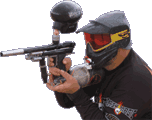  |
|
|
|
|
|
|
  |
|
|
|
|
|
|

|
by Mike Kraft 1) When you are walking toward/through a field to your starting point, keep your eyes on the field, so you can see advantages. Look for possible places that would make good offence/defense points. Try and take in the overall layout of the field so that you can make better tactical judgements. 2) Before you run to that “perfect bunker”, look around. Make sure that it is not a sole bunker in the middle of an open space. Look for trees/bunkers near it that you can advance to and fall back to if needed. This is always a good tactical decision. This allows you to always keep your options open, without being giving away your plan to the other team. 3) I know this one may sound dumb, but it works (although it is a tactic for bigger games, where you can not see the enemy when you start). When you are not spotted yet, try to crouch while walking and move more slowly. his is simple brain chemistry…the human brain notices movement immediately, and it draws a humans eye almost subconsciously. While doing this, try and keep some kind of cover (be it a tree, bunker, whatever) between you and any enemies that can see you. This not only provides cover, but also has added advantage of stealth…if they haven’t seen you yet, this way they won’t until its too late. A slow moving object will draw a lot less attention than someone darting across the field. Of course, there are some side rules to this…you must be somewhat camouflaged (it won’t work if your wearing hot pink). And one last thing, if you start taking fire, run to cover! 4) Here is a big mistake that newbies make time and time again. Try and remain as quiet as possible, and DO NOT FIRE UNLESS YOU HAVE A CLEAR SHOT. I have seen many a newbie waste hoppers full of paint, just to keep one enemies head down. They not only waste paint, they also give away their position to anyone who doesn’t know yet. This tactic is very useful. It is simple human nature, if under fire…duck and don’t come out. But, when you hold your fire, the opposition thinks it is safe to move, then they will try and advance, they come out into the open, then "Blam!" you hit them when they least expect it! 5) This tactic is for bunker to bunker fighting. It is best when you are protected from other opponents, and you only need to be concerned with one opponent in a bunker, but is good in almost any situation. Usually, bunker to bunker fighting is very dull…pop up, fire, duck…opponent pops up, returns fire, ducks…and usually it goes on like this until someone makes a lucky shot. When you go to return fire, stay up instead of ducking, but stop firing while keeping aim...The opposition thinks you have ducked, and when they pop up to return fire, “Blam”, you got ‘em! 6) When at all possible, stay low. The object of this is to minimize the physical area exposed to your opponent, therefore making it harder for them to hit you. 7) Avoid tunnel vision, keep your eyes and ears open. Tunnel vision is when you focus totally on one bunker/enemy. This not only limits your perspective of the overall game, but leaves you wide open to be flanked. 8) Sun Tzu’s “The Art of War” states “Know your enemy and know yourself.” This is more geared toward intermediate/experienced players. What I basically mean by this is know what your up against, and know what your capable of. Try and learn the advantages and dis-advantages of the most common paint guns, and you will be much better off. You need to know if your up against someone with a PGP (maximum accurate range=about 100) or someone with a flatline (maximum accurate range=about 300 feet). Sun Tzu also said, “Those who know when to fight and when not to fight are victorious.” a. Now for a bit of common knowledge. The average paintball gun has a maximum range of about 200 ft, this includes almost all paint guns, but there are exceptions. The flatline for example, uses a trick of aerodynamics in order to make their paintballs fly further. Most handheld pistol paint guns, such as the Nelspot 007, PGP, and PT Enforcer have very short barrels, and are only accurate to a range of about 100-140 feet, in ideal conditions.
10) Have fun! Many people forget that paintball was designed to
have fun! I have seen far too many people get too steamed over a
game, swearing, yelling…etc. It's just a game! And on to this subject,
don't cheat! Not only is this severely un-sportsmanlike, but it ticks
other people off! And chances are, when they see you do this, they
will light you up (fire and hit you at a high rate of fire), and they will
probably tell all their friends to do the same. But to reiterate…
HAVE FUN!!!
|
| Copyright © 1992-2019
Corinthian Media Services. WARPIG's webmasters can be reached through our feedback form. All articles and images are copyrighted and may not be redistributed without the written permission of their original creators and Corinthian Media Services. The WARPIG paintball page is a collection of information and pointers to sources from around the internet and other locations. As such, Corinthian Media Services makes no claims to the trustworthiness or reliability of said information. The information contained in, and referenced by WARPIG, should not be used as a substitute for safety information from trained professionals in the paintball industry. |